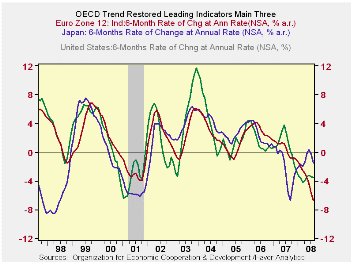 Global| Oct 10 2008
Global| Oct 10 2008OECD LEIs Signal Further Weakness
Summary
The OECD Leading Economic Indicators (trend adjusted cyclical indicators) are continuing to show distress. They point to continuing declines in the economies of the key OECD countries and regions. This report is updated through August [...]

The OECD Leading Economic Indicators (trend adjusted cyclical
indicators) are continuing to show distress. They point to continuing
declines in the economies of the key OECD countries and regions. This
report is updated through August and so the side it predicts pre-dates
the financial chaos that has since gripped the markets. The OECD likes
to look at six month changes in the indices to get the ‘best signal’.
On that basis most main indicators are not only falling but the rate of
their fall is accelerating. Europe has now moved to the fore in terms
of the pace of the unraveling among major countries and regions.
| OECD Trend-restored leading Indicators | ||||
|---|---|---|---|---|
| Growth progression-SAAR | ||||
| 3-Mos | 6-Mos | 12-Mos | Yr-Ago | |
| OECD | -5.1% | -4.3% | -3.1% | 1.2% |
| OECD7 | -7.1% | -4.8% | -4.1% | 0.5% |
| OECD Europe | -10.1% | -7.7% | -4.9% | 0.4% |
| OECD Japan | -5.0% | -2.2% | -0.5% | -3.1% |
| OECD US | -4.0% | -3.0% | -4.0% | 1.8% |
| Six month readings at 6-Mo Intervals: | ||||
| Recent six | 6-Mo Ago | 12-Mo Ago | 18-Mo Ago | |
| OECD | -4.3% | -1.8% | 0.0% | 2.4% |
| OECD7 | -4.8% | -3.3% | -0.2% | 1.1% |
| OECD Europe | -7.7% | -2.0% | -0.5% | 1.3% |
| OECD Japan | -2.2% | 1.3% | -7.2% | 1.1% |
| OECD US | -3.0% | -5.0% | 2.2% | 1.5% |
| Slowdowns indicated by BOLD RED | ||||
Robert Brusca
AuthorMore in Author Profile »Robert A. Brusca is Chief Economist of Fact and Opinion Economics, a consulting firm he founded in Manhattan. He has been an economist on Wall Street for over 25 years. He has visited central banking and large institutional clients in over 30 countries in his career as an economist. Mr. Brusca was a Divisional Research Chief at the Federal Reserve Bank of NY (Chief of the International Financial markets Division), a Fed Watcher at Irving Trust and Chief Economist at Nikko Securities International. He is widely quoted and appears in various media. Mr. Brusca holds an MA and Ph.D. in economics from Michigan State University and a BA in Economics from the University of Michigan. His research pursues his strong interests in non aligned policy economics as well as international economics. FAO Economics’ research targets investors to assist them in making better investment decisions in stocks, bonds and in a variety of international assets. The company does not manage money and has no conflicts in giving economic advice.
More Economy in Brief
 Global| Feb 05 2026
Global| Feb 05 2026Charts of the Week: Balanced Policy, Resilient Data and AI Narratives
by:Andrew Cates






